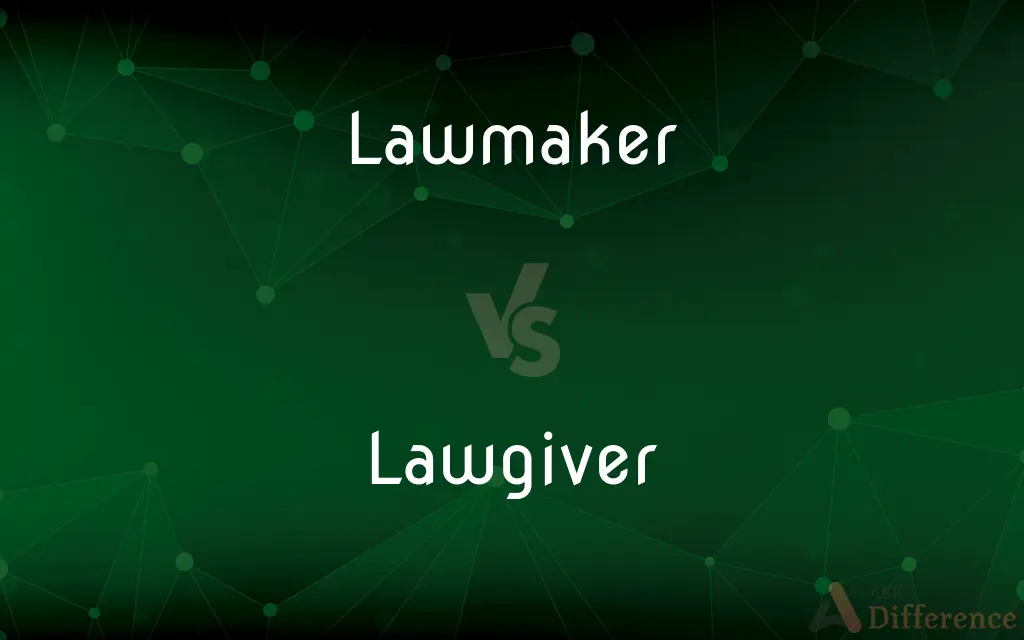Lawmaker vs. Lawgiver — What's the Difference?
By Maham Liaqat & Fiza Rafique — Updated on March 29, 2024
Lawmaker is a current member of a legislative body, while lawgiver is a historical or mythical figure who established a legal code.

Difference Between Lawmaker and Lawgiver
Table of Contents
ADVERTISEMENT
Key Differences
A lawmaker is an elected or appointed member of a legislative body, such as a parliament or congress, responsible for proposing, debating, and enacting legislation. On the other hand, a lawgiver is often a historical or mythical figure who is credited with establishing the foundational laws or legal codes for a society or nation.
While lawmakers work within existing legal and governmental frameworks to create or amend laws, lawgivers are seen as the original authors of a legal system or significant portions of it. For example, modern senators or representatives are lawmakers, whereas figures like Hammurabi or Moses are considered lawgivers due to their foundational contributions to legal systems.
The process of lawmaking involves collaboration, negotiation, and adherence to procedural rules within a legislative body. Lawgivers, however, are often depicted as singularly providing a comprehensive set of laws, sometimes perceived as divinely inspired or resulting from extraordinary wisdom.
The term "lawmaker" is used in contemporary political discourse and legal systems to describe someone actively involved in the legislative process. In contrast, "lawgiver" is a term more commonly found in historical or philosophical contexts, often imbued with a sense of reverence or myth.
Lawmakers operate in a specific political and legal context, their work subject to public opinion, political pressures, and the balance of power within the government. Lawgivers, by contrast, are often viewed through a lens of historical significance, their contributions forming the bedrock of legal and societal norms.
ADVERTISEMENT
Comparison Chart
Definition
An elected or appointed member of a legislative body
A historical or mythical figure who established a foundational legal code
Role
Proposes, debates, and enacts legislation
Credited with creating the foundation of a legal system
Context
Works within existing legal frameworks
Often seen as the originator of legal principles
Process
Collaborative, subject to rules and negotiations
Depicted as providing laws through singular wisdom or divine inspiration
Common Usage
Contemporary political and legal discourse
Historical, philosophical, and sometimes religious contexts
Compare with Definitions
Lawmaker
Their effectiveness can often be measured by the legislation they help to pass.
The lawmaker was celebrated for her role in passing comprehensive environmental protection laws.
Lawgiver
Often associated with the delivery of laws that have a foundational impact on society.
Moses is considered a lawgiver for bringing the Ten Commandments to the Israelites.
Lawmaker
A member of a legislative body involved in the creation and amendment of laws.
The lawmaker introduced a bill aiming to improve public health infrastructure.
Lawgiver
Their contributions are viewed as cornerstones of legal and moral frameworks.
Solon is celebrated as a lawgiver for his reforms and principles that laid the groundwork for Athenian democracy.
Lawmaker
Works within the procedural and political frameworks of their legislative body.
As a lawmaker, she must navigate complex political dynamics to pass her proposed legislation.
Lawgiver
Sometimes depicted as receiving laws through divine inspiration or extraordinary wisdom.
The lawgiver was said to have received the legal code during a moment of divine enlightenment.
Lawmaker
Subject to public opinion and political pressures in their lawmaking activities.
The lawmaker decided to revise the bill after listening to feedback from constituents.
Lawgiver
Their legacy often includes a mixture of myth and historical fact, enhancing their mystique.
The tales of the lawgiver's wisdom and the laws he established are still taught as part of our cultural heritage.
Lawmaker
Collaborates with other lawmakers in proposing, debating, and voting on legislation.
He worked closely with fellow lawmakers to secure bipartisan support for the bill.
Lawgiver
A figure credited with founding or significantly shaping a legal system.
Hammurabi is revered as a lawgiver for his codification of laws in ancient Babylon.
Lawmaker
A legislator.
Lawgiver
One who gives a code of laws to a people.
Lawmaker
One who makes or enacts laws.
Lawgiver
A legislator.
Lawmaker
A legislator; a lawgiver.
Lawgiver
One who provides laws to a society.
Lawmaker
A maker of laws; someone who gives a code of laws
Lawgiver
Any lawmaker.
Lawgiver
One who makes or enacts a law or system of laws; a legislator.
Lawgiver
A maker of laws; someone who gives a code of laws
Common Curiosities
What distinguishes a lawmaker from a lawgiver?
Lawmakers are current members of legislative bodies creating laws, while lawgivers are foundational figures who established legal codes.
Can a lawmaker become a lawgiver?
Typically, "lawgiver" refers to a historical or mythical status; modern lawmakers are rarely described this way.
Are lawgivers always real historical figures?
Not always; some lawgivers are mythological, with their stories blending fact and fiction.
Why are lawgivers important in history?
They are credited with establishing the foundational laws that shape societies' moral and legal frameworks.
Is the concept of a lawgiver universal?
While the term might differ, the concept of a central figure establishing a society's laws is common across cultures.
Do all cultures have figures considered lawgivers?
Most cultures have historical or mythical figures revered for contributing significantly to their legal or moral codes.
How does one become a lawmaker?
Becoming a lawmaker usually involves being elected or appointed to a legislative body.
How do lawmakers affect daily life?
Through legislation that impacts various aspects of society such as education, safety, and economic policies.
What role does democracy play in the work of a lawmaker?
In democratic systems, lawmakers are accountable to the electorate and must consider public opinion and welfare in their legislative efforts.
How do lawmakers enact legislation?
They propose, debate, and vote on bills within the framework of their legislative body.
What is an example of a lawmaker's work?
Examples include passing legislation on healthcare, education, and environmental protection.
Who are some famous lawgivers?
Figures like Hammurabi, Moses, and Solon are often cited as famous lawgivers.
Are lawgivers considered to have absolute authority?
Historically, lawgivers were often viewed as having supreme wisdom or authority in establishing laws.
How do legislative bodies operate?
Legislative bodies operate through committees, debates, and voting processes to enact laws.
How is the legacy of a lawgiver preserved?
Through historical records, cultural narratives, and the enduring impact of their legal codes on society.
Share Your Discovery

Previous Comparison
Vainglory vs. Pride
Next Comparison
Aim vs. RationaleAuthor Spotlight
Written by
Maham LiaqatCo-written by
Fiza RafiqueFiza Rafique is a skilled content writer at AskDifference.com, where she meticulously refines and enhances written pieces. Drawing from her vast editorial expertise, Fiza ensures clarity, accuracy, and precision in every article. Passionate about language, she continually seeks to elevate the quality of content for readers worldwide.
















































